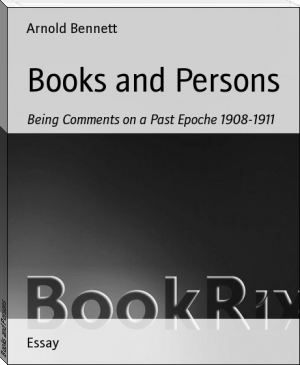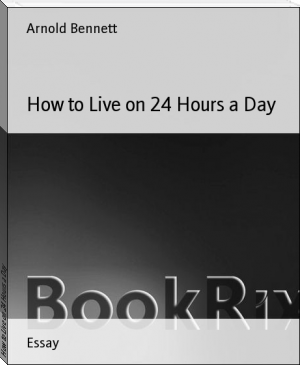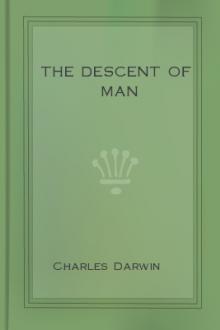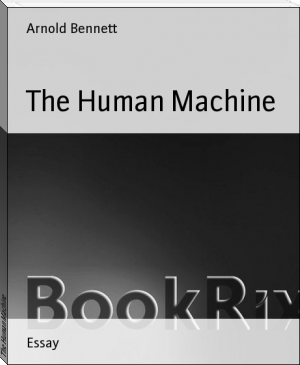Books and Persons - Arnold Bennett (phonics readers .TXT) 📗

- Author: Arnold Bennett
Book online «Books and Persons - Arnold Bennett (phonics readers .TXT) 📗». Author Arnold Bennett
_Mother, O grey sea-mother, thine is the crowning cry!_--
I am bound to interrupt the quotation here in order to vent my feelings of extreme irritation caused by the mere phrase. "O grey sea-mother." Why should this phrase drive me to fury? It does. Well, to recommence:
_Mother, O grey sea-mother, thine is the crowning cry!_
_Thine the glory for ever in the nation born of thy womb!_
_Thine is the Sword and the Shield and the shout that Salamis heard,_
_Surging in AEschylean splendour, earth-shaking acclaim!_
_Ocean-mother of England, thine is the throne of her fame!_
Fancy standing on the shore to-day and addressing the real sea in these words and accents! Fancy the poet doing it! The mood and the mentality are prehistoric. I would not mind Mr. Noyes putting himself lyrically into the woaded skin of our ancestors. But I do think he might have got a little nearer the mark in indicating the "throne of her fame." Because I expect Mr. Noyes knows as well as anybody that the real throne of England's fame is not in the sea at all. England's true fame springs from the few acts of national justice which she has accomplished, and from the generous impulses which as a nation she has had--as, for example, in her relations with Italy; as, for example, in the Factory Acts which prevented children from working eighteen hours a day six or seven days a week. The patriotic versifiers of this country will, if they persist, end by making the sea impossible for a plain man to sail on. I have long felt that I want never again to read anything about the sea, except the advertisements of auxiliary yawls and cutters in the _Yachting World_. I recommend these advertisements as a balm for sores caused by rhymed marine Jingoism.
A BOOK IN A RAILWAY ACCIDENT
[_20 July '11_]
Books are undoubtedly cursed, and rendered unreadable in a new sense. I don't know how many years it is since I was informed that Villiers de l'Isle-Adam's "L'Eve Future" was a really fine novel. I bought it, and I was so upset, in my narrow youthfulness, to find that the author had made a hero of Thomas Alva Edison, and called him by his name, that I could not accomplish more than two chapters. Later I was again informed that "L'Eve Future" was a really fine novel, and I had another brief tussle with it, and was vanquished by its dullness. I received a third warning, and started yet again, and disliked the book rather less, and then I completely lost it in a removal. After months or years it mysteriously turned up, like a fox-terrier who has run off on an errand of his own. But I did not resume it. And then after another long interval the idea that I absolutely must read "L'Eve Future" gathered force in my mind, and I decided that the next time I went away for a week-end I would take it with me. This was in France. I took it away with me. I read a hundred pages on the outward journey and I got on terms with "L'Eve Future." _"Ce livre m'attendait,"_ as a certain French novelist said when he read "Tom Jones." On the return journey I was deep buried in "L'Eve Future," when a fearful jolting suddenly began to rock the saloon carriage in which I was. The jolting grew worse, very much worse. Women screamed. I saw my stick fly out of the rack above my head across the carriage. The door leading to the corridor jumped off its hinges. Then shattered glass fell in showers, and I saw an old lady beneath an arm-chair and a table. The shape of the carriage altered. And then, after an enormous crash, equilibrium was established amid the cries of human anguish. I had clung to the arms of my seat and was unhurt, but there were four wounded in the carriage. My eye-glasses were still sticking on my nose. Saying to myself that I must keep calm, I put them carefully away, and began to help to get people out of the wreck. It was not until I looked about for my belongings that I saw that the corner of a tender had poked itself into our carriage. Outside, a mail-van and two enormous coaches were lying very impressively on their sides, and two wounded girls were lying on the grass by the track, and people were shouting for doctors. I ultimately got away with my bag and stick and hat, and walked to the nearest station, where a porter naturally asked me for my ticket. I hired an auto and reached Paris only a quarter of an hour late for dinner. And I congratulated myself on my calmness and perfect presence of mind in a railway accident. Only "L'Eve Future" was not in my bag. I had forgotten it, and my presence of mind had thus been imperfect. I did not buy another copy of "L'Eve Future," and I don't think I ever shall, now.
"FICTION" AND "LITERATURE"
[_31 Aug '11_]
Publishers' advertisements of imaginative work are so constantly curious that one gets accustomed to their bizarre qualities and refrains from comment. But Messrs. Hutchinson, who are evidently rather proud of having secured Lucas Malet's new long novel, have thought of a new adjective, and the event must be chronicled. They are announcing to the world that Lucas Malet's new novel is "literary"--"the literary novel of the autumn." I cannot be quite sure what this means, but it is probably intended to signify that, in the opinion of Messrs. Hutchinson, Lucas Malet's novel is very special--that is to say, it is not a mere novel. Less adroit publishers than Messrs. Hutchinson might have described it as an "art novel." (_Cf._ "art furniture," all up Tottenham Court Road.) Some of the most esteemed provincial dailies have a column headed "Literature" on five days of the week, but on the sixth day that column is headed "New Fiction." You see the distinction. Messrs. Hutchinson are doubtless hinting to the provinces that the new book is something between "literature" and "fiction," and combines the superior attributes of both. Once the _Athenaeum_, apparently staggered by the discovery that Joseph Conrad existed, reviewed a novel of his under the rubric of "Literature," instead of with other novels under the rubric of "Fiction." Messrs. Hutchinson have possibly an eye also on the _Athenaeum_. Personally, I would not permit my publishers to advertise a novel of mine as literary. But on the whole I wouldn't seriously object to the adjective "unliterary."
Publication Date: 08-17-2010
All Rights Reserved





Comments (0)